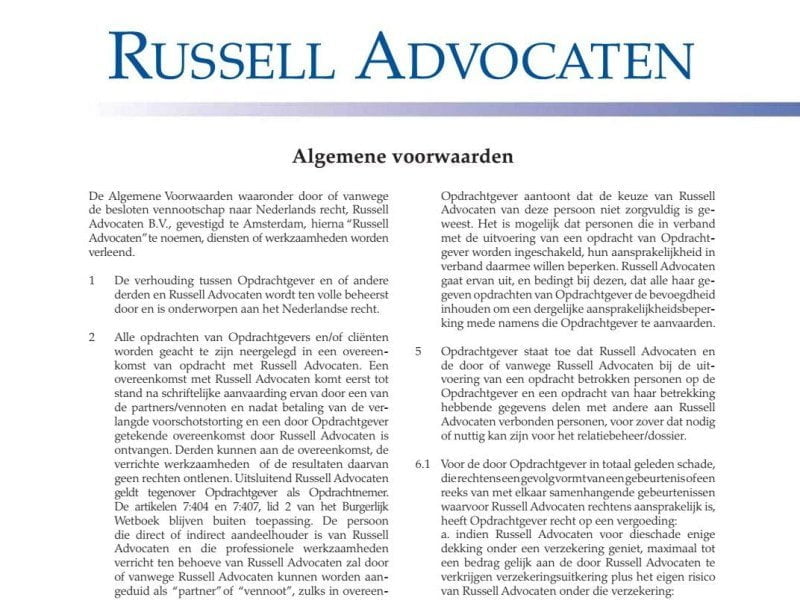Reinier advises national and international companies
reinier.russell@russell.nl +31 20 301 55 55Liability for damage can lead to high compensation payments. Is it possible to exclude liability completely, or can it merely be limited? And what measures do you have to take to do so?

This is one of the most common questions we are asked by entrepreneurs. The question is obvious, as liability for damage can lead to high compensation payments. So is it possible to exclude liability completely, or can it merely be limited? And what measures do you have to take to do so?
In contracts you can lay down what you will or won’t be liable for. As it is inefficient to negotiate each contract separately, General Terms and Conditions are an efficient solution for standard limitations.
A clause included in the General Terms and Conditions which limits or excludes liability is called an exoneration clause. An exoneration clause must be drawn up correctly and its content has to be accurate as well. Otherwise, there is a high risk that the clause will not be (fully) valid and thus liability would not be excluded after all.
The requirements for an exoneration clause are (partly) stipulated by law:
In order to assess the validity of an exoneration clause, the Court will not just consider the statutory requirements but also the circumstances of a specific situation. For instance,
An exoneration clause can limit your liability extensively, provided that certain requirements are met. A clause that limits liability to too great an extent can be declared void. By this you will also be held liable for matters you could have excluded.
If you intend to exclude liability, you will have to take the following steps:
In the event an exoneration clause is invoked, check whether all (legal) requirements have been met and if the exoneration clause may be declared void.
Would you like to know more about the exclusion of liability, drafting contracts and/or General Terms and Conditions? Please contact:
Reinier W.L. Russell, LL.M. (reinier.russell@russell.nl).
On 16 December 2025, the House of Representatives of the Netherlands adopted the Digital General Meeting for Private Law Legal Entities Act. This Act makes it possible to hold general meetings entirely digitally. What does this mean for directors and shareholders of private limited companies, public limited companies and other legal entities?
As of 1 January 2026, the Money Laundering and Terrorist Financing (Prevention) Act (Wwft) will change. Cash payments of EUR 3,000 or more will then be prohibited. What does this mean for the retail sector and the art trade?
When can directors be held personally liable? What can directors do to prevent being held personally liable?
A franchise agreement is often linked to an agreement for the lease of business premises. What happens if the franchisor and franchisee have a conflict? Does the lease agreement remain in force if there are problems with the franchise?
Managing a nonprofit organization requires not only idealism and dedication, but also a sensible approach to legal opportunities and risks. This ensures that the charity is future-proof. What are the important issues that need to be properly addressed?
Almost all companies now use some form of AI. This means that they may be subject to the prohibitions and regulations set out in the European AI Act. How can you ensure that you comply with these rules?